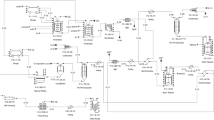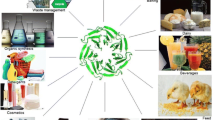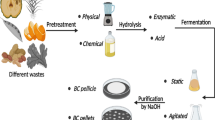Abstract
To excavate the application of Jerusalem artichoke on poly(γ-glutamic acid) (γ-PGA) production, a γ-PGA producing strain Bacillus amyloliquefaciens NX-2S154 was obtained through atmospheric and room temperature plasma mutagenesis, which produced 14.83 ± 0.31 g/L of γ-PGA in batch fermentation with raw inulin extract. Simultaneous saccharification and fermentation (SSF) by adding commercial inulinase were further investigated for γ-PGA fermentation. Results showed SSF could eliminate the ineffective utilization of inulin while avoiding inhibition effect of high concentration substrate, which made γ-PGA concentration reach 18.54 ± 0.39 g/L with the process being shortened by 17%. Finally, an immobilized column for reducing inulinase cost was introduced to γ-PGA production. Repeated batch cultures showed the novel bioreactor exhibited higher stability and simplicity and gave average γ-PGA concentration and productivity of 19.40 ± 0.37 g/L and 0.27 ± 0.008 g/L/h, respectively. This work proposes a productive method for efficient γ-PGA production using Jerusalem artichoke feedstock.





Similar content being viewed by others
References
Ashiuchi M, Misono H (2002) Biochemistry and molecular genetics of poly-gamma-glutamate synthesis. Appl Microbiol Biotechnol 59:9–14
Liu X, Liu F, Liu S, Li H, Ling P, Zhu X (2013) Poly-γ-glutamate from Bacillus subtilis inhibits tyrosinase activity and melanogenesis. Appl Microbiol Biotechnol 97:9801–9809
Cho SH, Kim A, Shin W, Min BH, Noh HJ, Hong KS, Cho JH, Yong TL (2017) Photothermal-modulated drug delivery and magnetic relaxation based on collagen/poly(γ-glutamic acid) hydrogel. Int J Nanomed 12:2607–2620
Jia C, Huang W, Tang X, Ding S, Yang W, Li Z, Fu G, Rayas-Duarte P (2016) Antifreeze activity of γ-polyglutamic acid and its impact on freezing resistance of yeast and frozen sweet dough. Cereal Chem 93:3
Sakamoto S, Kawase Y (2016) Adsorption capacities of poly-γ-glutamic acid and its sodium salt for cesium removal from radioactive wastewaters. J Environ Radioact 165:151
Lei P, Xu Z, Ding Y, Tang B, Zhang Y, Li H, Feng X, Xu H (2015) Effect of poly(γ-glutamic acid) on the physiological responses and calcium signaling of rape seedlings (Brassica napus L.) under cold stress. J Agr Food Chem 63:10399
Feng X, Tang B, Jiang Y, Xu Z, Lei P, Liang J, Xu H (2016) Efficient production of poly-γ-glutamic acid from cane molasses by Bacillus subtilis NX-2 immobilized on chemically modified sugarcane bagasse. J Chem Technol Biotechnol 91:2085–2093
Ashiuchi M, Kamei T, Baek DH, Shin SY, Sung MH, Soda K, Yagi T, Misono H (2001) Isolation of Bacillus subtilis (chungkookjang), a poly-γ-glutamate producer with high genetic competence. Appl Microbiol Biotechnol 57:764–769
Bajaj IB, Lele SS, Singhal RS (2009) A statistical approach to optimization of fermentative production of poly(γ-glutamic acid) from Bacillus licheniformis NCIM 2324. Bioresour Technol 100:826–832
Zhang H, Zhu J, Zhu X, Jin C, Zhang A, Hong Y, Jin H, Lei H, Xu Z (2012) High-level exogenous glutamic acid-independent production of poly-(γ-glutamic acid) with organic acid addition in a new isolated Bacillus subtilis C10. Bioresour Technol 116:241–246
Cao M, Geng W, Liu L, Song C, Xie H, Guo W, Jin Y, Wang S (2011) Glutamic acid independent production of poly-γ-glutamic acid by Bacillus amyloliquefaciens LL3 and cloning of pgsBCA genes. Bioresour Technol 102:4251–4257
Peng Y, Jiang B, Zhang T, Mu W, Miao M, Hua Y (2015) High-level production of poly(γ-glutamic acid) by a newly isolated glutamate-independent strain, Bacillus methylotrophicus. Process Biochem 50:329–335
Shoaib M, Shehzad A, Omar M, Rakha A, Raza H, Sharif HR, Shakeel A, Ansari A, Niazi S (2016) Inulin: properties, health benefits and food applications. Carbohydr Polym 147:444–454
Qiu Y, Lei P, Zhang Y, Sha Y, Zhan Y, Xu Z, Li S, Xu H, Ouyang P (2018) Recent advances in bio-based multi-products of agricultural Jerusalem artichoke resources. Biotechnol Biofuels 11:151
Long X, Huang Z, Zhang Z, Li Q, Zed R, Liu Z (2010) Seawater stress differentially affects germination, growth, photosynthesis, and ion concentration in genotypes of Jerusalem artichoke (Helianthus tuberosus L.). J Plant Growth Regul 29:223–231
Szambelan K, Nowak J, Jelen H (2005) The composition of Jerusalem artichoke (Helianthus tuberosus L.) spirits obtained from fermentation with bacteria and yeasts. Eng Life Sci 5:68–71
Qiu Y, Sha Y, Zhang Y, Xu Z, Li S, Lei P, Xu Z, Feng X, Xu H (2017) Development of Jerusalem artichoke resource for efficient one-step fermentation of poly-(γ-glutamic acid) using a novel strain Bacillus amyloliquefaciens NX-2S. Bioresour Technol 239:197–203
Dao TH, Zhang J, Bao J (2013) Characterization of inulin hydrolyzing enzyme(s) in commercial glucoamylases and its application in lactic acid production from Jerusalem artichoke tubers (Jat). Bioresour Technol 148:157–162
Kalil SJ, Suzan R, Maugeri F, Rodrigues MI (2001) Optimization of inulinase production by Kluyveromyces marxianus using factorial design. Appl Biochem Biotechnol 94:257–264
Nguyen QD, Rezessy-Szabó JM, Czukor B, Hoschke Á (2011) Continuous production of oligofructose syrup from Jerusalem artichoke juice by immobilized endo-inulinase. Process Biochem 46:298–303
Zhang D, Feng X, Zhou Z, Zhang Y, Xu H (2012) Economical production of poly(γ-glutamic acid) using untreated cane molasses and monosodium glutamate waste liquor by Bacillus subtilis NX-2. Bioresour Technol 114:583–588
Dong TT, Gong JS, Gu BC, Zhang Q, Li H, Lu ZM, Lu ML, Shi JS, Xu ZH (2017) Significantly enhanced substrate tolerance of Pseudomonas putida nitrilase via atmospheric and room temperature plasma and cell immobilization. Bioresour Technol 244:1104–1110
Zhao B, Li Y, Li C, Yang H, Wang W (2018) Enhancement of Schizochytrium DHA synthesis by plasma mutagenesis aided with malonic acid and zeocin screening. Appl Microbiol Biotechnol 102:2351–2361
Gao J, Xu H, Li QJ, Feng XH, Li S (2010) Optimization of medium for one-step fermentation of inulin extract from Jerusalem artichoke tubers using Paenibacillus polymyxa ZJ-9 to produce R, R -2,3-butanediol. Bioresour Technol 101:7076–7082
Li L, Li L, Wang Y, Du Y, Qin S (2013) Biorefinery products from the inulin-containing crop Jerusalem artichoke. Biotechnol Lett 35:471
Chi Z, Chi Z, Zhang T, Liu G, Yue L (2009) Inulinase-expressing microorganisms and applications of inulinases. Appl Microbiol Biotechnol 82:211
Kango N (2008) Production of inulinase using tap roots of dandelion (Taraxacum officinale) by Aspergillus niger. J Food Eng 85:473–478
Singh RS, Sooch BS, Puri M (2007) Optimization of medium and process parameters for the production of inulinase from a newly isolated Kluyveromyces marxianus YS-1. Bioresour Technol 98:2518–2525
Gao J, Xu YY, Yang HM, Xu H, Xue F, Li S, Feng XH (2014) Gene cloning, expression, and characterization of an exo-inulinase from Paenibacillus polymyxa ZJ-9. Appl Biochem Biotechnol 173:1419–1430
Szambelan K, Nowak J, Chrapkowska KJ (2004) Comparison of bacterial and yeast ethanol fermentation yield from Jerusalem artichoke (Helianthus tuberosus L.) tuberus pulp and juices. Acta Sci Pol Technol Aliment 3:45–53
Sun LH, Wang XD, Dai JY, Xiu ZL (2009) Microbial production of 2,3-butanediol from Jerusalem artichoke tubers by Klebsiella pneumoniae. Appl Microbiol Biotechnol 82:847–852
Zhang L, Zhao H, Gan M, Jin Y, Gao X, Chen Q, Guan J, Wang Z (2011) Application of simultaneous saccharification and fermentation (SSF) from viscosity reducing of raw sweet potato for bioethanol production at laboratory, pilot and industrial scales. Bioresour Technol 102:4573
Xu Q, Zang Y, Zhou J, Liu P, Li X, Yong Q, Ouyang J (2016) Highly efficient production of d-lactic acid from chicory-derived inulin by Lactobacillus bulgaricus. Bioprocess Biosyst Eng 39:1–9
Li K, Qin JC, Liu CG, Bai FW (2016) Optimization of pretreatment, enzymatic hydrolysis and fermentation for more efficient ethanol production by Jerusalem artichoke stalk. Bioresour Technol 221:188–194
Flores AC, Morlett JA, Rodríguez R (2016) Inulin potential for enzymatic obtaining of prebiotic oligosaccharides. Crit Rev Food Sci Nutr 56:1893–1902
Chang MY, Juang RS (2004) Stability and catalytic kinetics of acid phosphatase immobilized on composite beads of chitosan and activated clay. Process Biochem 39:1087–1091
Holyavka MG, Artyukhov VG, Seredin PV (2016) The interaction of inulinase molecules with a chitosan matrix: UV-induced changes in the functional properties of immobilized inulinase. Biophysics 61:871–876
Yuan WJ, Zhao X, Chen L, Bai F (2013) Improved ethanol production in Jerusalem artichoke tubers by overexpression of inulinase gene in Kluyveromyces marxianus. Bioprocess Biosyst Eng 18:721–727
Ling J, Qian W, Xu Q, Zhu L, He H (2017) Fermentative hydrogen production from Jerusalem artichoke by Clostridium tyrobutyricum expressing exo-inulinase gene. Sci Rep 7:7940
Westbrook AW, Moo-Young M, Chou CP (2016) Development of a CRISPR-Cas9 tool kit for comprehensive engineering of Bacillus subtilis. Appl Environ Microbiol 82:4876
Kongklom N, Luo H, Shi Z et al (2015) Production of poly-γ-glutamic acid by glutamic acid-independent Bacillus licheniformis TISTR 1010 using different feeding strategies. Biochem Eng J 100:67–75
Acknowledgments
This work was funded by the National Nature Science Foundation of China (No. 21878152; No. 21506098; No. 21776133), the Nanchang Hongcheng Specialist Project, the Six Talent Peaks Project in Jiangsu Province (2016-SWYY-027), Graduate Student Innovation Project of Jiangsu Province (No. KYCX18_1112).
Author information
Authors and Affiliations
Corresponding author
Ethics declarations
Conflict of interest
The authors declare no conflict of interest.
Additional information
Publisher's Note
Springer Nature remains neutral with regard to jurisdictional claims in published maps and institutional affiliations.
Rights and permissions
About this article
Cite this article
Qiu, Y., Zhang, Y., Zhu, Y. et al. Improving poly-(γ-glutamic acid) production from a glutamic acid-independent strain from inulin substrate by consolidated bioprocessing. Bioprocess Biosyst Eng 42, 1711–1720 (2019). https://doi.org/10.1007/s00449-019-02167-w
Received:
Accepted:
Published:
Issue Date:
DOI: https://doi.org/10.1007/s00449-019-02167-w




